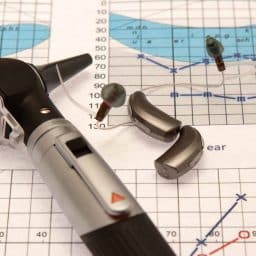Understanding Sounds: How Do Amplitudes & Frequencies Impact Hearing?

The term sound describes energy that travels in waves. There are two ways to measure these waves: amplitude and frequency. Amplitude is reported in decibels (dB), while frequency is reported in Hertz (Hz). Below we review how amplitudes and frequencies impact your hearing. Amplitude Decibels measure amplitude, which can also be stated as the pressure…
How To Help Children With Hearing Loss Who Experience Fatigue

Hearing loss makes your brain work harder to process speech and sounds. While hearing aids and other assistive listening devices can help, listening fatigue can pose challenges to school-aged children with hearing loss. Studies have shown that this can lead them to experience more subjective fatigue than students with normal hearing. Let’s examine some of…
How to Protect Your Hearing When You Live in a Big City

The most common causes of hearing loss are aging and exposure to loud noises. But did you know that where you live can also affect whether or not you have hearing loss? It turns out, living in big cities is associated with higher rates of hearing loss. In fact, one study from 2012 uncovered that…
The Link Between Hearing Loss & Chickenpox

Chickenpox is a type of viral infection characterized by a rash and blisters. Though chickenpox is a mild disease for most people, it can be dangerous for those who aren’t vaccinated and have never had the condition before. Fortunately, the number of hospitalizations and deaths caused by chickenpox has dropped significantly since the 1990s thanks…
Tips for Camping with Hearing Loss

What’s more relaxing than a nap in a hammock or roasting marshmallows by the campfire at Bear Canyon Trail Campground? Not much – in fact, research shows that spending time outdoors is linked to increased cognition and better mood. For people with hearing loss, camping can be just as relaxing; however, you may need to…
Does Your Child Have Hearing Loss?

While universal newborn hearing tests catch the majority of hearing loss in children, some do not develop hearing loss until they are slightly older. Studies have varied throughout the years, but the Center for Disease Control and Prevention’s Third National Health and Nutrition Examination Survey found that 14.9% of children ages 6-19 had some degree…
Why Do So Many Veterans Get Tinnitus?

Millions of Americans experience tinnitus every year. Veterans, especially those who have experienced military combat, seem to be at an increased risk for the condition. What is Tinnitus? Tinnitus is often described as a ringing in the ears, but can also sound like hissing, buzzing, roaring, sizzling, clicking or other noise. People may experience acute…
Ways to Protect Your Ears While Flying

If you’re planning a summer vacation this year, take some time to think about how you’re going to protect your ears before you take off at Los Angeles International Airport. Minimize Risk of Hearing Loss on Flight Exposure to loud noise is one of the leading causes of hearing loss, along with aging. It’s not…
Stress Awareness Month: How Stress Affects Hearing Loss

Did you know? April is Stress Awareness Month! If you’re feeling stressed, it can actually impact your hearing health. Below we review the connection as well as tips for managing stress. How Is Stress Connected to Hearing Health? Below is a look at some of the ways stress can impact your hearing health: How to…
Selective Hearing vs. Hearing Loss: How to Tell the Difference

It’s happened to all of us at one point or another. We’re watching a movie or engrossed in a book and don’t hear our loved one ask for help making dinner or bringing in groceries. This is jokingly referred to as “selective hearing.” However, if you notice yourself or your spouse is having more and…